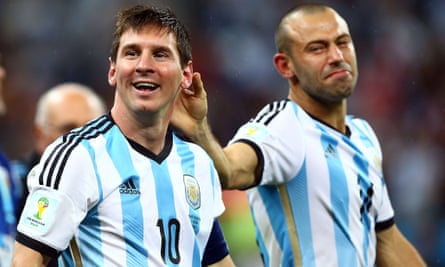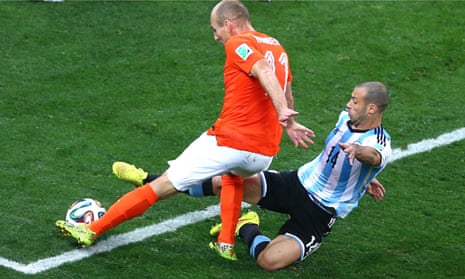Not many footballing ambitions can teeter on the line as precariously, as viciously, as in the 90th minute of a World Cup semi-final. Those were the stakes for Javier Mascherano as he chased Arjen Robben, intent on protecting his goal, his tournament, his country, as the Dutchman hared towards goal. Mascherano puffed out his cheeks, pumped the necessary adrenaline through his veins. The spurt of effort he required was visible for all to see. He looked completely driven to catch Robben, as if it was the last thing he would ever do in his life.
Mascherano has played every single minute of Argentina’s mission in Brazil, relentlessly covering and tackling and directing operations superbly from deep in midfield. Logically, he was not the favourite to overtake Robben, a much faster player who was in front of him.
It was the burst of acceleration – delving into the dregs of his energy reserves even though his muscles would feel the pain – that summed up his contribution as much as the pure tackle on which Argentina’s World Cup fate hung. “I thought I’d slipped,” he mused afterwards. “I thought I wouldn’t make it. I thought he’d get ahead of me. I thought of so many things. But I did get there, and it wasn’t a goal.”
The fear, though, had been extreme. “It was terrible,” he says. “Robben played a great exchange with Sneijder and, one more touch, with that control he made, gave me the possibility, that extra split second. I threw myself into it. If I was off, it was a penalty. There’s no virtue. Anyone could have done that. I had the luck to get there, we had the luck that Robben took one more touch. To get to a final you always need a bit of luck.”
Pinning that moment on fortune is sweetly self-depracating. All Mascherano’s experience, the years practising to so smartly read, anticipate and react to situations, was behind that critical interception. Football tends to admire great tackles rather than love them in the way that a goal becomes cherished. But Mascherano’s effort was a beautiful thing. It was one of the great, defining moments of this World Cup. It summed up a flawless personal display in which he won all of his tackles and did not concede a single foul as he orchestrated the plan to nullify Holland’s attack. All this came after a clash of heads that appeared to leave him momentarily concussed. Some in the medical profession would insist his game should have been over there and then.
There he was, after 120 minutes, galvanising. It was no surprise to see how he took over once it came to setting the tone for the penalty shootout. He led the team-talk, then took Sergio Romero aside. He looked the goalkeeper in the eyes, shaking a clenched fist, and told him: “Today, you become a hero.” Then he gave him a kiss on the cheek and went off to take his place with those supporting the takers. “Mascherano is a symbol, an emblem, of our national team. He took this huge weight on his shoulders,” said Alejandro Sabella admiringly.
Then came the tears. So many have been shed at this World Cup. Brazil had even made them into a talking point given how their tidal waves of emotion seemed to make them even less capable of playing with focus. Mascherano’s tears as Argentina made the final were so hard-earned. His streak of toughness and strategic play is as vital to his team as Lionel Messi’s flashes of attacking dazzle.
The outpouring, he feels, was only natural, the consequence of a lifelong aspiration. “I have spent a lot of time waiting for this moment,” he explains. “This is my third World Cup and maybe my last one.”

Of course he was emotional. Mascherano was a baby when Diego Maradona inspired Argentina to become champions in 1986. He has his memories of 1990, when Germany spoiled the dream of another conquest. “There in the eyes of the world is our country, our flag, returning to a World Cup final,” he says. “It’s a delight that lifts your soul. It’s something you can’t explain, it’s something I never imagined. I hope we can win on Sunday.”
Despite the fact that Germany will inevitably be fresher, Mascherano rejects the idea that there is not much left in the tank. “There’s always something left,” he says. “It’s a final. It’s the most important match of our careers. I think the only thing we have to avoid is thinking about the scale of the situation.
“Germany are formidable. They have technique, potential, style. They beat Brazil so well. We’ll have to be very concentrated, not give them space. We know that, with space, they’re so dangerous. We played with our heads [in the semi-final], tactically perfect. We were very concentrated, very narrow, running and we didn’t leave space for Holland. We have to put in the best possible match against Germany. I have had 11 years where we have seen a lot of things but haven’t seen the light, but tonight we started to see it.”
Mascherano’s international career is intriguing in that he actually made his debut for the national team before he got to play first team football for his club, River Plate. Now he has more than 100 caps. A nomadic early part of his career, where he was part-owned by a number of companies, saw him leave Argentina at the age of 21. He spent time at Corinthians, West Ham and Liverpool before adding his anchoring instincts to Barcelona. The fact that he has played a lot of football in defence at the Camp Nou gives him that extra instinct to help out with confidence where necessary.
During a semi-final that lacked the shock factor or sophisticated football that made Germany’s demolition of Brazil so captivating, Mascherano’s performance was a shining light. If Argentina are to deny Germany at the Maracanã, they will need him to excel again to give them a possible platform.
He will continue to lead on and off the pitch. The little man is able to spread courage around his team. Earlier in the tournament, as he gave a team talk during Argentina’s slog against Belgium, he told them he no longer wanted to “eat shit”. He will do whatever it takes to inspire the ultimate big result in this World Cup.
“In life, there’s a bit of everything,” he says. “You always have to … ”
He hesitates as he searches for the right expression.
“… Eat a little bit of dirt.”

